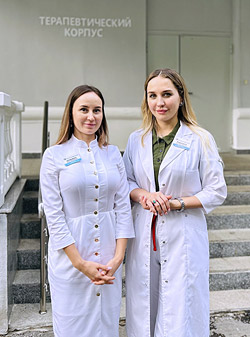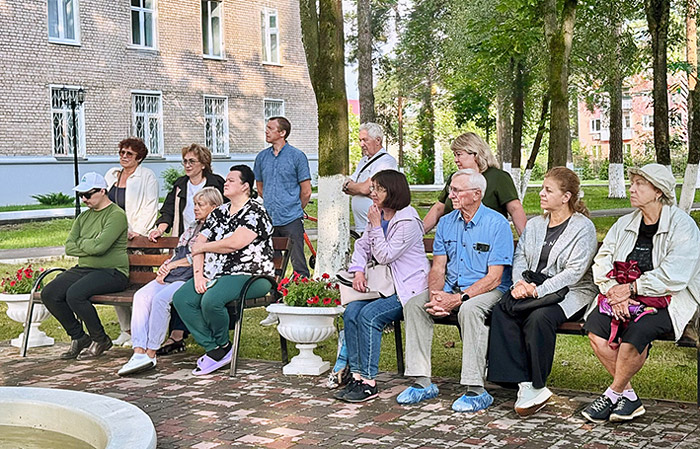
Electronic english version since 2022 |
The newspaper was founded in November 1957
| |
Educational meetings
On 22 July, a series of lectures and informal meetings with expert doctors entitled "I just ask" started at the Medical Unit No. 9 of the FMBA of Russia.
 The topic of the first meeting was timed to coincide with World Brain Day, dedicated to neuromedicine and was called "What our brain needs to be productive". The lecture was held in the park near the fountain in front of the Therapeutic Building, in the fresh air. In the format of a live dialogue, the specialist doctors Head of the Department for patients with acute cerebrovascular accident Olga Maysheva and the neurologist Anastasia Karulina spoke about cognitive health, prevention of cognitive impairment and afterwards, answered questions from the guests.
The topic of the first meeting was timed to coincide with World Brain Day, dedicated to neuromedicine and was called "What our brain needs to be productive". The lecture was held in the park near the fountain in front of the Therapeutic Building, in the fresh air. In the format of a live dialogue, the specialist doctors Head of the Department for patients with acute cerebrovascular accident Olga Maysheva and the neurologist Anastasia Karulina spoke about cognitive health, prevention of cognitive impairment and afterwards, answered questions from the guests.
"Cognitive health and cognitive efficiency are the brain's abilities to perceive, process and use information that comes from the outside world," the neurologist Anastasia Karulina defined the terms. Afterwards, the neurologist talked about four factors that need to be monitored during life to maintain and restore cognitive health. "The first factor is nutrition. The content of a large amount of Omega-3 and Omega-6 fatty acids is very important. The second is physical activity. If a person is engaged in aerobic exercise every day, for example, riding a bicycle, this is very good. 40 minutes of walking every day provides generally comprehensive health prevention. Aerobic oxidation contributes to the fact that neuronal growth factor is produced in the brain, it protects against oxidative stress and helps to ensure that disorders pass away. The third factor is social relations. This is often forgotten. If a person becomes socially isolated, then he begins to destroy himself a little. At least, three significant contacts per week are minimally needed. A very important fourth factor is the occurrence of any goal in a person's life. With its loss, severe cognitive impairment occurs in a very short time. It happens that a person loses his job or gets injured, in a month and a half, a person can go to bed and not get up from it," concluded Anastasia Karulina.

Head of the Department Olga Maysheva also said that many patients come and expect to obtain a "magic pill" from their problem. However, it does not work and specialist doctors use an integrated approach to diagnosis and treatment on an individual basis. The patient is interviewed, tested, passes the tests and the state of significant factors in his or her life is revealed before therapy is prescribed. Drug treatment is prescribed only if necessary. And it will not be effective if the main factors that were told at the very beginning are severely violated. Olga Maisheva also recalled the importance of balancing brain and physical activity, especially, if a person does a lot of intellectual work and thinks that it is enough to maintain cognitive health.
An important issue was raised about Alzheimer's disease and dementia. These diseases carry an irreversible process of cognitive impairment but thanks to modern medicine, it can be slowed down. Olga Maysheva highlighted that genetic predisposition is of great importance in this matter and if there were people with such a disease in the family, then this is a reason to seriously focus on the issue of prevention.
"If we talk about neurodegeneration, then this is a process when the accumulation of bad proteins occurs inside the nerve cells and the cells stop functioning. Alzheimer's disease is when proteins have accumulated in large numbers and the brain function deteriorates. These proteins cannot be decomposed," the neurologist Anastasia Karulina highlights.
"Also, people often do not observe the circadian rhythm. We, doctors always talk about sleep patterns from 11:00 PM to 2:00 AM. At this time, the lymphatic system works in the brain that clears it of bad proteins. If a person does not sleep at this time, then his protein "errors" obtained during the day do not go away. As a result, they accumulate and consequently, depressive episodes, anxiety, cognitive impairment occur," Olga Maysheva added to her colleague's story.
The specialists were asked personal and important questions for many about medicines, symptoms and treatments that they gladly answered and reflected about. However, the doctors emphasized the need to come to them for a personal appointment for accurate diagnosis and finding solutions. Thus, residents of the city were able to get useful information, access to high-class specialists without recording and some guidance on further actions on their issues.
Maria KARPOVA